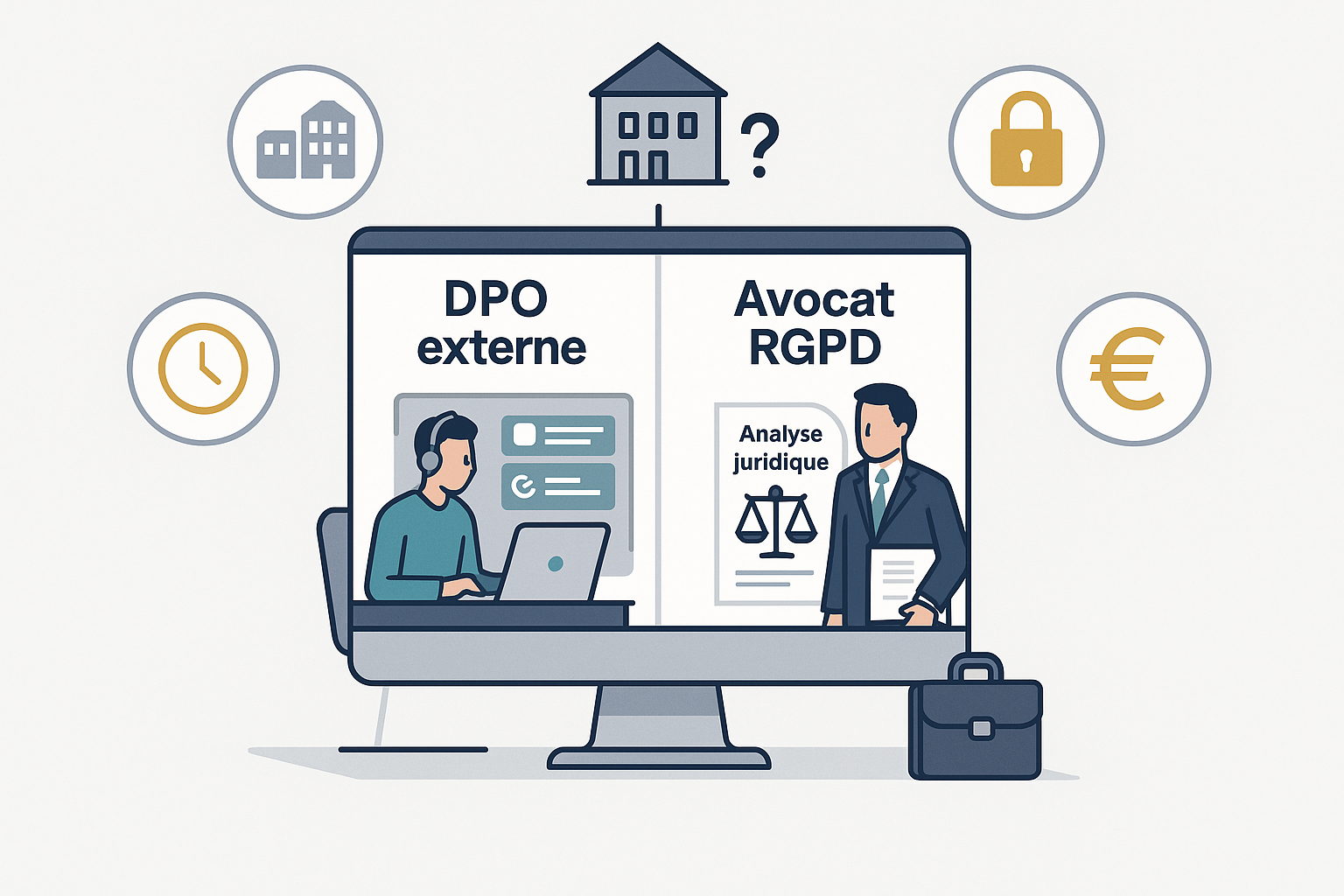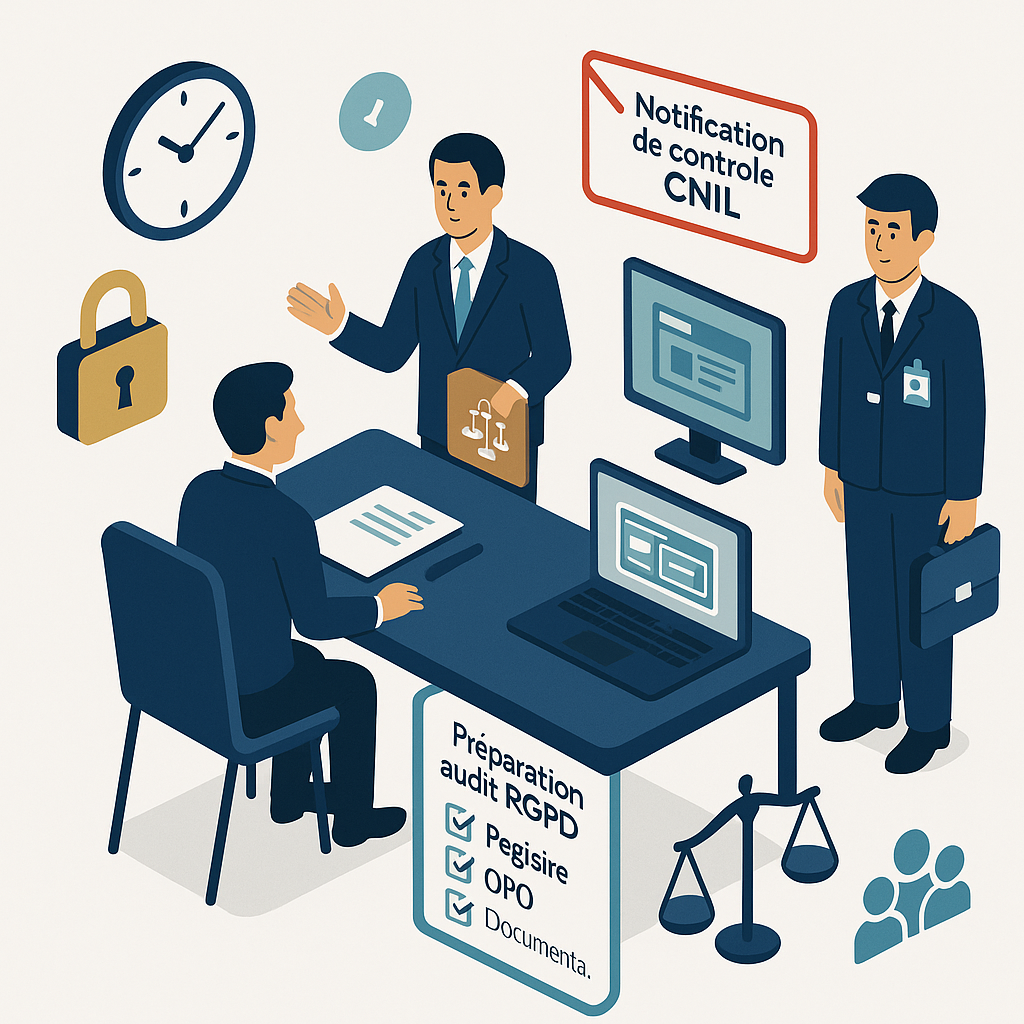
DPO externe ou avocat RGPD : quelle solution choisir pour votre mise en conformité ?
Face aux exigences strictes du Règlement Général sur la Protection des Données (RGPD), les entreprises
Whether you're an in-house DPO looking for support, or a company looking for an external DPO, I offer a range of professional services tailored to your needs.

In the context of the General Data Protection Regulation (RGPD) and the French Data Protection Act, the role of the Data Protection Officer (DPO) has become essential.
The DPO plays akey role in the management of personal data, which encompasses all information that directly or indirectly identifies an individual.
However, the DPO is not mandatory in all situations.
The appointment of a Data Protection Officer (DPO) by the CNIL becomes mandatory for any entity other than a public authority, when it
Thus, the appointment of a DPO is essential for organizations engaged in these types of activities to ensure strict compliance with the RGPD
From preventing data processing risks to facilitating communication with regulatory authorities, the DPO is a strategic asset for strengthening compliance, preserving reputation and promoting a culture of confidentiality within the organization.
His appointment or support therefore becomes a key element in navigating the complex landscape of personal data protection with confidence.

Start by immersing yourself in the legal framework for data protection: the RGPD and the Loi Informatique et Libertés. Familiarize yourself with the guidelines, recommendations and best practices issued by the CNIL. Set up a legal and technical watch to stay up to date.

Make sure you're accessible: set up direct communication channels such as a dedicated email address and telephone number. Inform the whole organization of your role, missions and future projects through an internal communication plan.

Meet with management and key employees to understand their needs, and integrate yourself into their processes.
Use the DPO logo to reinforce your presence and legitimacy in all communications.

Launch awareness-raising initiatives to instill a culture of data protection throughout the organization.
This can include training courses, interactive workshops, or a variety of communication media.

RGPD compliance is a dynamic process. Make sure you carry out regular audits and adjust strategies in line with legislative developments and business needs.
Ignoring the appointment of a Data Protection Officer (DPO) in the context of the RGPD can expose a company to considerable risks and penalties. Fines for non-compliance can amount to up to €20 million or 4% of worldwide annual sales.
In France, the CNIL, which plays a crucial role in enforcing the RGPD, can impose heavy financial penalties, compliance injunctions and even daily penalty payments. It also has the power to act swiftly via a fast-track procedure, issuing reminders or fines of up to €20,000. What's more, in the event of non-compliance, company directors are liable to criminal sanctions, including up to 5 years' imprisonment and a €300,000 fine.
Consequently, appointing a competent and effective DPO is a key element in avoiding these risks and ensuring ongoing compliance with the RGPD. Using a DPO lawyer is a relevant solution!

Face aux exigences strictes du Règlement Général sur la Protection des Données (RGPD), les entreprises

La CNIL intensifie ses contrôles depuis l’entrée en vigueur du RGPD. Préparez-vous efficacement au contrôle

Voici les 5 erreurs les plus coûteuses en cas de manquement au RGPD et aux
The roles and responsibilities of a Data Protection Officer (DPO) are vast and crucial to ensuring an organization's compliance with the RGPD. As DPO, you will have several key missions:
You will be the main advisor to the organization that appointed you, as well as its employees, on all matters relating to the RGPD and the Data Protection Act. You will provide expert advice on data protection best practices. This can also fall to a DPO lawyer.
Your role includes monitoring compliance with data protection regulations, both RGPD and national law, and ensuring that the organization follows established standards.
You will advise on the completion of data protection impact assessments and verify their execution to identify and mitigate potential risks.
You'll be the point of contact for people affected by the processing of their personal data, responding to their questions and concerns. This point of contact can be a DPO lawyer!
As the point of contact with the CNIL, you will work closely with the supervisory authority to ensure compliance with regulations.
To get off to a good start in this role, it is essential to :
This role as conductor of RGPD compliance involves a proactive approach, effective communication and close collaboration with all the organization's stakeholders.
Anyone with the requisite skills and knowledge of data protection legislation and practices can be appointed as a Data Protection Officer (DPO). The RGPD does not impose specific criteria in terms of professional qualifications, but it does insist on the need for the DPO to have expertise in data protection law and practices relating to data management.
The DPO may be an employee of the organization, or perform his or her duties on the basis of a service contract. In both cases, it is imperative that the DPO is able to act independently, without any conflict of interest, particularly if the DPO holds other positions within the organization.
The key is that the DPO has the knowledge, competence and ability to perform the required tasks, as defined by the RGPD, including raising awareness, advising, supervising compliance, and cooperating with the supervisory authorities.
This appointment may also involve a lawyer as DPO.
The appointment of a Data Protection Officer (DPO) is required in several specific contexts, in accordance with the General Data Protection Regulation (GDPR):
In short, the appointment of a DPO is essential for organizations meeting these criteria, to ensure compliant and effective management of personal data.
The appointment of a Data Protection Officer (DPO) is not systematically mandatory for all companies. According to the European Union's General Data Protection Regulation (GDPR), the obligation to appoint a DPO depends on certain specific conditions:
For companies that do not fall into these categories, appointing a DPO remains an option that can be chosen to strengthen compliance and data protection risk management, but it is not legally mandatory. However, it is still crucial for all businesses to comply with the RGPD's other personal data protection requirements.
Appointing a DPO lawyer can be a solution!